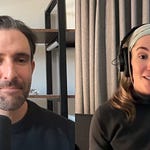Video/podcast summary
New companies allow us to go around doctors and get blood work that checks for 100+ biomarkers or a full-body MRI to scan for cancer when we don’t have symptoms.
The idea of taking your health into your own hands and preventing disease with a direct-to-consumer test sounds perfect in theory. But there are some downsides to consider if you test yourself, and knowing those downsides can help you get better health outcomes from the test.
I spoke to Dr. Bobby Dubois—an M.D., researcher, and Ph.D. in health policy—about how we should think about direct-to-consumer blood tests and disease screenings.
Watch our convo in the video above or listen to it via the podcast.
Read below to see all the topics we covered.
Housekeeping
This post, like all Monday posts, is free to all subscribers.
But only Members get full access to Wednesday and Friday posts. Become a Member here:
Or follow this link for seven free days of Two Percent. We partnered with Substack to give you a free weeklong Membership through the app.
ICYMI:
On Wednesday, we covered how to use circadian rhythm science to improve your fitness and get a better outcome if you had a medical procedure or treatment, or had to take a medication.
On Friday’s Expedition post, we gave a 30-second longevity test, the 4 keys to resilience, optimal dose and timing of melatonin for sleep, and more.
Audio/podcast version
Context for the video and podcast
I first met Dr. Bobby Dubois when he joined my Misogi event in Costa Rica. I quickly discovered that Bobby is a wealth of health wisdom.
As he should be—Bobby went to Harvard, got his M.D. at Johns Hopkins, did his internal medicine training at Harbor-UCLA, and received a Ph.D. in health policy from RAND, the health policy research leader.
He worked in medicine and healthcare throughout his career. He’s now retired and running a ranch in Texas while also hosting the podcast Live Long and Well with Dr. Bobby.
Bobby and I had fascinating conversations in Costa Rica. I also loved when Bobby told me at the end of the Misogi, “I’ve done IRONMAN triathlons, but that was the hardest thing I’ve ever done.”
I appreciate Bobby’s view of health. He’s violently practical and considers research. But he also accounts for the human experience and how we all see “living well” differently.
Bobby and I had a great email exchange about the rise of companies that allow you to test your blood or get a full-body MRI without a doctor’s order. I.e., Deep testing services for prevention rather than a doctor-ordered test you’d get if you came into a hospital with a symptom.
I asked Bobby if he’d chat about the topic for Two Percent. And so here we are.
In the video above and podcast, Bobby and I cover:
Bobby’s background and how that’s shaped his thinking about health and medicine.
Preventative tests that are currently available to consumers, from blood tests that check 100+ markers to full-body MRIs and blood screenings that detect cancer.
The upsides of these tests.
The differences between preventative, direct-to-consumer medical tests and doctor-ordered medical tests.
Why the results of medical tests and scans aren’t perfect, and how those imperfections can lead to unnecessary stress, costs, procedures, and your ability to get life insurance.
Understanding the math behind preventative blood testing—why you’re likely to have at least one blood marker out of range and why that can be misleading.
What you should know before getting tested and what to do if your test comes back with abnormalities.
How abnormalities in your results are like the credit card fraud alerts you get from your bank.
What the data says about routine screenings compared to preventative full-body MRIs and direct-to-consumer blood tests.
The three categories of cancer and how full-body MRIs are helpful for only one of them.
The counterintuitive downsides of catching a certain category of cancer with a full body MRI.
Questions to ask your doctor if they’d like you to get a medical test like a CAT scan, MRI, or special type of blood work.
How to work with your doctor to get the most from any medical tests you take.
Bobby’s final thoughts on direct-to-consumer preventative medical tests.
Takeaway in eight sentences
Dr. Bobby generally doesn’t recommend direct-to-consumer medical tests that test 100+ panels or scan your full body. He believes they have more downsides than upsides. But if you want to get one, that’s totally fine! There’s a healthy debate in the space (we’ve linked to other opinions below). Listen to our conversation in the video or podcast so you understand the limitations of these tests and what to do when you inevitably get a result that “looks scary.” Having this wisdom can help you make better use of your results and save you a lot of worry and money spent on follow-up tests. The key is to analyze your results with a doctor who understands your priorities around health. I’ve linked to a good doctor below who does remote consults about test results.
Notes and links
Screening math infographic. In short, of 1,000 men who get a PSA-based prostate cancer screening, 3 will avoid the cancer spreading to other organs, 1 will avoid death, 5 will die even if they get treatment, 240 will get a positive result that may be a false positive, cancer that wasn’t going to hurt them, or lead to treatments that come with harmful side effects.
If you want a doctor to read your blood, this doctor is forward-thinking and does remote consultations. Mention that you came from Two Percent for blood work analysis.
Why cancer screening may not save lives—Vinay Prasad’s take.
Why cancer screening may save lives—Peter Attia’s take.
South Korea’s thyroid cancer screening experiment (here and here). In short: “In 2011, the rate of thyroid-cancer diagnoses in the Republic of Korea was 15 times that observed in 1993, yet thyroid-cancer (deaths) remain stable — a combination that suggests that the problem is overdiagnosis attributable to widespread thyroid-cancer screening.”
American College of Radiology statement on total body MRI cancer screening.
A debate on colonoscopies with three leading thinkers on colon cancer screening.
Have fun, don’t die, and if you get a preventative test, make sure you have a good doctor who can talk you down off the ledge if your results convince you that you’re going to die.
-Michael
Partnered with GOREWEAR
GOREWEAR designs endurance gear for Two Percenters. Their products are tailored for athletes and optimized to help you perform in any weather. GOREWEAR leverages the most cutting edge science and works. No matter how hard we train or what Earth throws at us. Use code EASTER30 for 30% off your next order. Discover more at www.gorewear.com.












Share this post